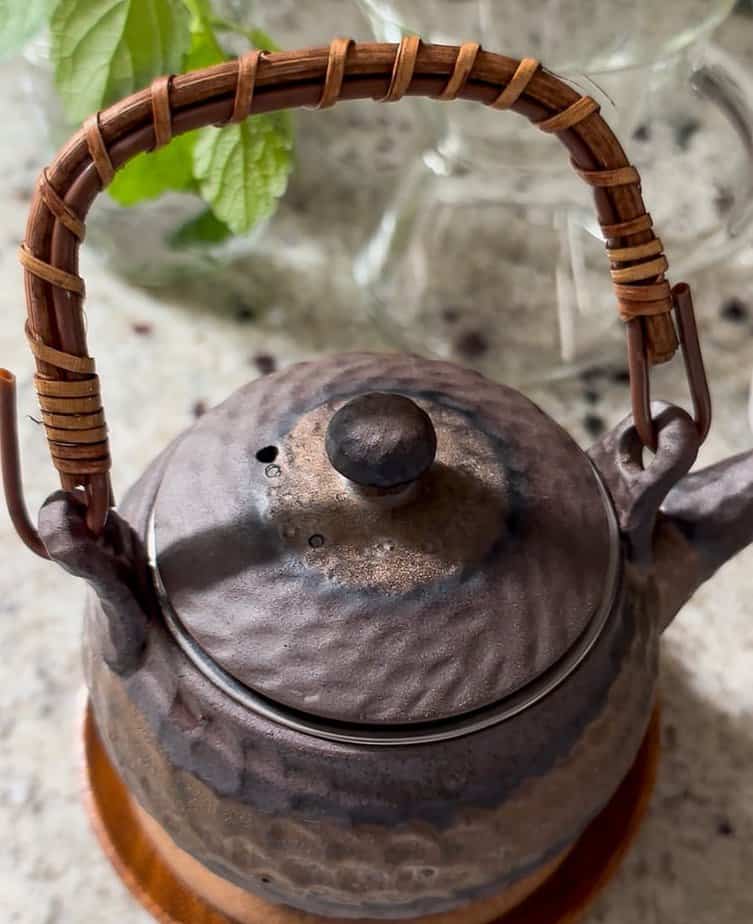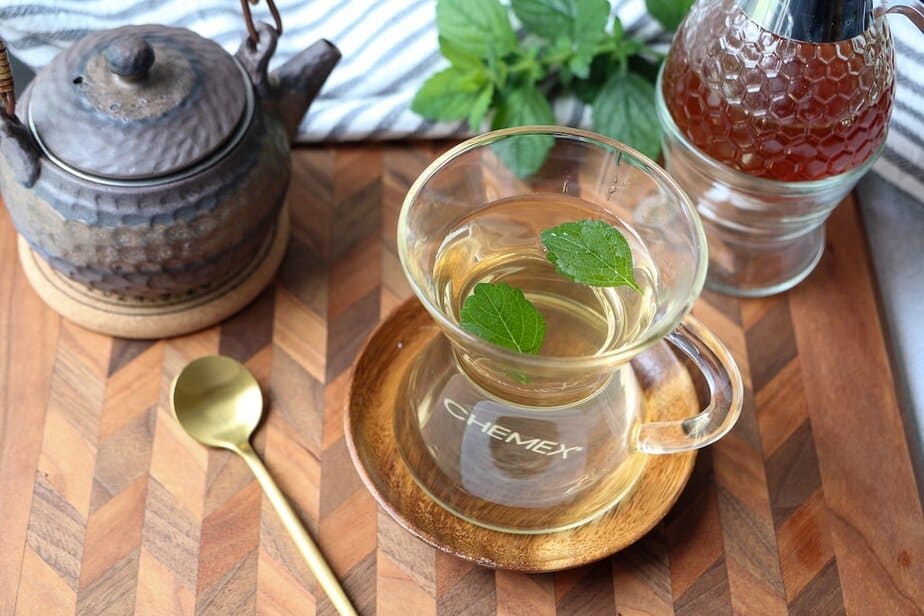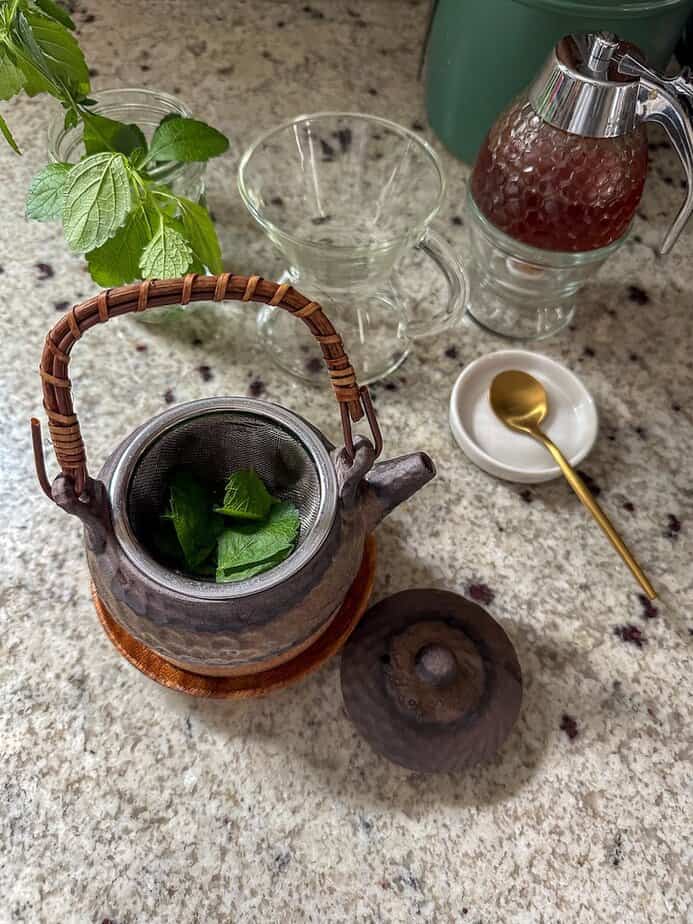If you have Lemon Balm growing in your garden, you already know how fragrant and refreshing it is. A perennial in the mint family, lemon balm has a light, lemony flavor similar to lemongrass, but milder. For centuries, it’s been valued for its medicinal properties, most commonly for easing stress, aiding in digestion, and promoting restful sleep. As a Registered Nurse certified in Nutritional Health with studies in Herbal Medicine, I love sharing how simple, everyday plants like lemon balm can help support wellness. This simple Lemon Balm Tea recipe is one of my favorite ways to enjoy this herb, especially as a calming evening routine.

I planted lemon balm in my garden several years ago, and every season I look forward to brewing tea with its fresh leaves. With my background in nutritional health and herbal medicine, I especially appreciate how this simple herb supports relaxation and restorative sleep. A warm cup of this tea helps me unwind, and when I pair it with my diffuser misting lavender essential oil, it’s lights out for me! I also love that the flavor is gentle and mild, not overpowering.
Ingredients
- Fresh lemon balm leaves
- Boiling water
- Honey, raw – for a slight sweet flavoring and soothing properties.
How to Make Lemon Balm Tea
Lemon Balm tea is one of the easiest, medicinal, herbal teas you can make.



Honestly, you just rub some leaves together, place them in a cup or mug, pour hot water over the leaves and let it steep for 5-10 minutes while keeping the cup covered with a saucer or teacup cover. Remove the leaves and add honey. That’s it!
Sip and enjoy!
Tip: covering the cup while it steeps keeps the flavor and oils from leaves in, while keeping the cup warm.
Medicinal Benefits of Lemon Balm Tea
Lemon Balm is a nervine herb which helps to calm the nervous system and stabilize emotions.
Supports relaxation and reduces stress: Lemon balm is known for its calming properties. Studies have shown that it helps reduce anxiety and promote a sense of calm and relaxation.
Promotes restful sleep: a cup of lemon balm tea before bedtime helps aid in a restful night’s sleep. Add other herbs, such as lavender or chamomile for a homemade sleepytime tea.
Aids in digestion: lemon tea can help relieve indigestion, bloating, and mild stomach upset.
May support cognitive function: some studies have shown that while lemon balm can support relaxation and relieve stress, it also can help with mental clarity and focus.
Rich in antioxidants: As with many herbs, lemon balm is rich in antioxidants that help protect the body from oxidative stress and helps support overall wellness.

Tips and Variations
Fresh vs. Dried: fresh lemon leaves are more aromatic than dried. While dried is less aromatic and flavorful it has similar medicinal properties as fresh.
Tea blends: for flavor and herbal variations add chamomile, lavender or mint.
Iced Lemon Balm Tea: grab a few handfuls of leaves – place in a pot covered with water, bring to a boil and simmer for about 10 minutes. Drain and cool. Pour over ice and sweeten with honey or lemon balm syrup and enjoy as an iced tea.
Wellness Ritual: drinking lemon balm tea, warm or cold, before bed will help signal your body that it is time to relax and prepare for sleep.

Lemon Balm Tea is more than just an herbal tea, it’s a gentle natural way to support relaxation, ease digestion and calm the nervous system. Whether you grow it yourself or purchase fresh or dried, this soothing tea is easy to prepare and a wonderful addition to any self-care routine.
The next time you want to slow down and nourish your mind and body, brew a warm cup of lemon balm tea and enjoy its calming effects.
If you enjoy Lemon Balm and all it’s benefits, check out my Lemon Balm Pesto as a savory to incorporate this herb into your food.
For other herbal remedies, try this soothing Homemade Cough Syrup.
How to Make Lemon Balm Tea
Ingredients
- 4-5 Lemon balm leaves
- 1 cup hot water
- 1 tsp honey, raw
Instructions
- Add the lemon balm leaves to a heatproof cup or teapot, rubbing the leaves between your fingers to release its oils.
- Pour boiling water over the leaves and allow to steep for 5-10 minutes. Cover the tea with a heat proof lid or saucer, while it steeps to help retain the beneficial oils and flavor.
- Remove the leaves and stir in the honey.
- Sip this warm herbal tea and enjoy it's relaxing effects.







